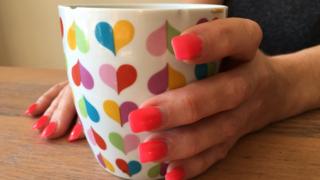‘My husband ran up a £58,000 debt in my name’

Annie says her husband abused her both physically and financially
When she had her first baby, just before she turned 29, Annie had been married for eight years, managed 19 staff, and earned more than her husband.
She knew he could be rude and aggressive in company but she says she had always “stuck up for him”, at the cost of becoming estranged from her own family.
But when the baby was born the balance of power shifted – she was made redundant while on maternity leave and he got a pay rise and promotion.
She took a lower-paid, part-time job but he refused to share the cost of childcare or increase the amount he paid towards household expenses.
He had always paid the mortgage on their home near Reading, with Annie responsible for everything else, but when two more children followed within four years, Annie struggled to cover food, bills, clothes, shoes and other essentials.
Worse, he began paying his credit card bills, for luxury items and holidays for himself, from the household accounts.
Her story is typical of a pattern of controlling behaviour known as economic abuse, say campaigners.
Nicola Sharp-Jeffs, director of UK charity Surviving Economic Abuse, describes it as “an almost invisible form of domestic abuse”.
Dr Sharp-Jeffs says it can mean victims feel unable to leave abusive partners, even in the face of physical violence, and wants the government to press ahead with plans to include it in a new statutory definition of domestic abuse.
Image copyright
Getty Images
“So we had his account, my account and a joint bills account,” remembers Annie.
“He would buy himself stuff on the credit cards, and obviously the more he spent…. the more the direct debit increased. So I would have to put more money in.”
The result, she says, was that her husband “had tons of money”, because his spending, on items like motorbikes, high-end photographic equipment and designer clothes, was all charged to the joint account.
“Meanwhile there used to be a boot sale in the field over there and I’d get up every Sunday morning and buggy the kids round there to buy them 20p trousers.”
‘So isolated… so controlled’
Annie’s husband was becoming increasingly violent – by the end of their marriage he was beating her daily.
“As soon as I’d had the first one, he started hitting me.
“He was completely remorseful after he’d done it the first time and I had flowers and he was crying and said he would never do it again.
“It’s not like someone comes into your life one day and they hit you. They work on you slowly at first so you will put up with being hit…
“I was so isolated… you’re so controlled by that point.”
Annie went full-time at work in a bid to bring in more money, but says: “I still didn’t have enough money to pay for his lifestyle or for the food for all of us, so I got an evening cleaning job”.
For five years she worked 60 hours a week, sleeping only four or five hours a night.
After a full day at work, she would put the children to bed and go to her cleaning job at 21:00, finishing there at 01:00 and getting up again at 06:00 as her husband didn’t like the youngsters waking him.
Not only that, her husband would insist on dinner, just for himself, all paid for and cooked by Annie, ready on a tray when he came in from work every night.
Failure would result in a beating.
“It makes me cringe now, thinking that I had actually got to that state.”
Broken shoes
He blamed her for their financial problems, accusing her of being unable to manage her money, so she felt guilty even replacing a pair of broken shoes.
The bank encouraged her to take out a loan to pay off a £7,500 overdraft on the joint account, but they failed to close the overdraft so he ran it up again.
She took out another loan and this time the bank did cancel the overdraft.
But with no overdraft, his spending quickly emptied the joint account, so the bank turned to her account and, with this emptied too, it finally drew funds from his account, provoking fury.
The couple met one lunchtime in the town centre to discuss it and he swung a punch at her face.
“I ran off to go back to work and he said: “You can run but I am going to finish the job when I get home.”
At work, Annie broke down in a meeting and her boss took her aside and handed her the number of a women’s refuge.
“I just picked the kids up from school and we just drove – and that was it.”
She stayed in the refuge for six weeks before returning home once her husband was persuaded to leave.
Image copyright
‘Annie’
Annie and her children stayed in the refuge for six weeks
She had to get an injunction and a panic alarm to stop him coming to the house, screaming abuse and attacking friends.
But, she says, even with the loss of his income, the family were “instantly” better off once her ex-husband, and his out-of-control spending, had gone.
Overall, once all the credit cards, store cards and direct debits had come in, Annie was left with debts of about £58,000.
She also took over the mortgage, determined to keep her home.
The bank tried to repossess the house but she won on appeal and they wrote off £8,000 of what she owed.
In 2017, she finally cleared the debt – 12 years after the marriage ended – and has almost paid off the mortgage.
The house is shabby and bare but at least it is hers, she says.
There are questions she thinks people in a similar position should ask themselves. “Are things equal? Do they spend their money on luxuries while you don’t have any kind of money? Can you talk freely about finances without anyone kicking off?”
As a volunteer with Surviving Economic Abuse, she now realises it was a key factor in keeping her in the relationship for so long.
“I had no money whatsoever. I couldn’t magic any credit out of anywhere,” she says.
“In my head I hated him. I didn’t stay with him because I loved him.
“I was just like a shell but there was a tiny something in there that knew what he was doing was wrong and I had to get away.”
“Annie” asked the BBC not to use her real name.


